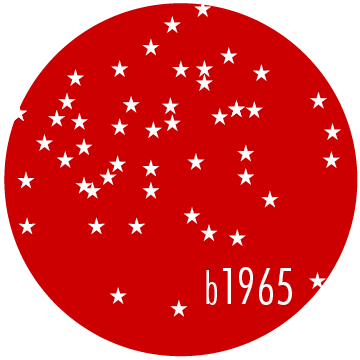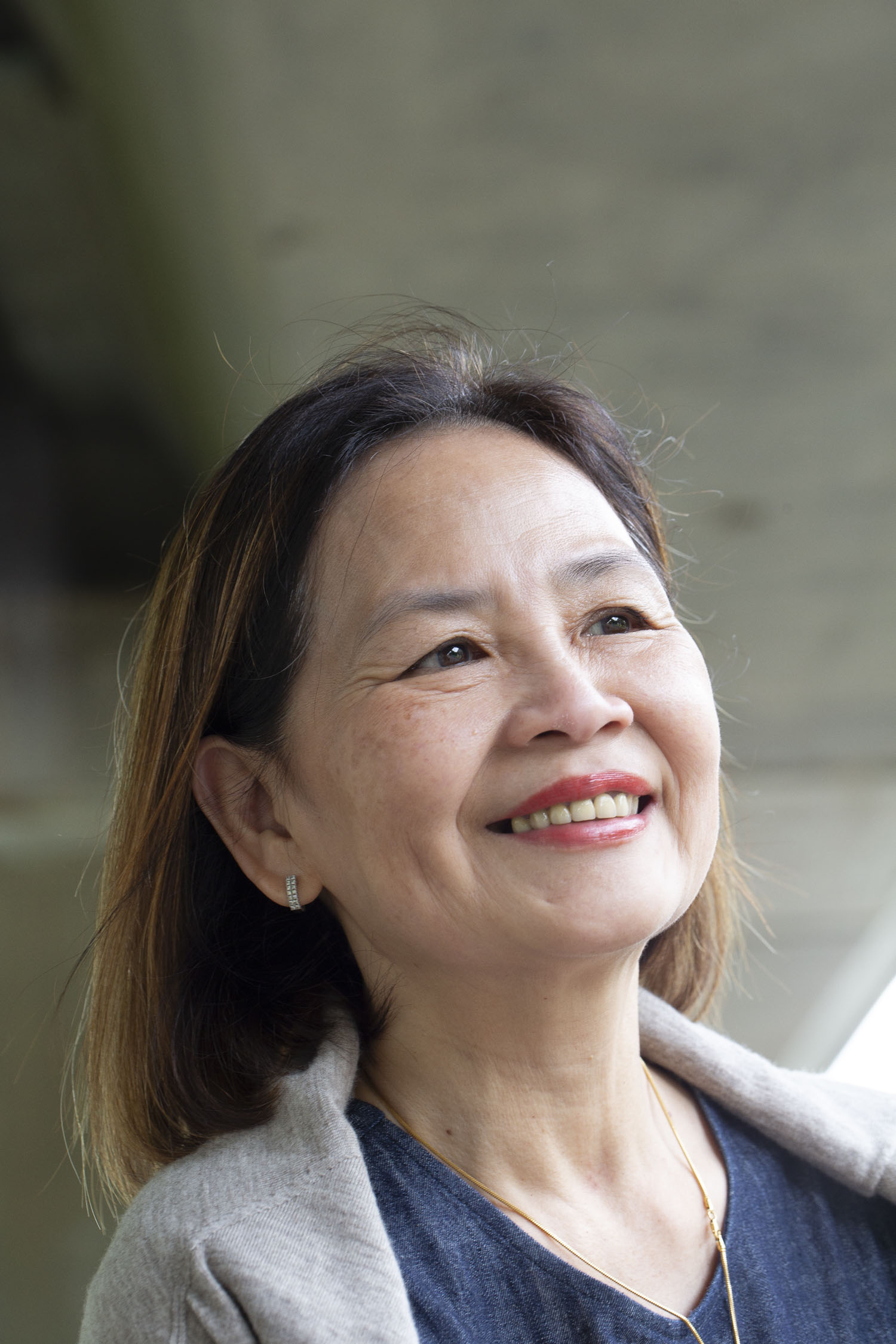Eileen TAN entered the hospitality industry at the age of 17, at a time when the idea of women working in the sector was frowned upon. A strong sense of independence led her to work overseas, including a hotel in Tokyo as part of an exchange programme, and postings in China and Taiwan. Currently, she is employed by a real estate company involved in residential, commercial and hotel acquisitions and investments. Since 2020, she has served as a senior manager of the hospitality department for Asia.
Let’s start with your childhood.
I was born in KK (Kandang Kerbau Women’s and Children’s Hospital) and if I remember correctly, my first home was an attap house in Geylang Lorong 24A.
We then moved to a one-room rental flat in Jalan Satu, in the Old Airport Road area, in the late 60s or early 70s.
I remember walking past Kong Hwa School every morning on my way to the PAP-run kindergarten, which was between Lorong 34 and Lorong 36, Geylang.
In those days, it was quite common for a kindergarten to be in a shophouse. My school uniform was maroon in colour. Both my parents worked and my siblings attended other schools, so I had to walk to the kindergarten by myself.
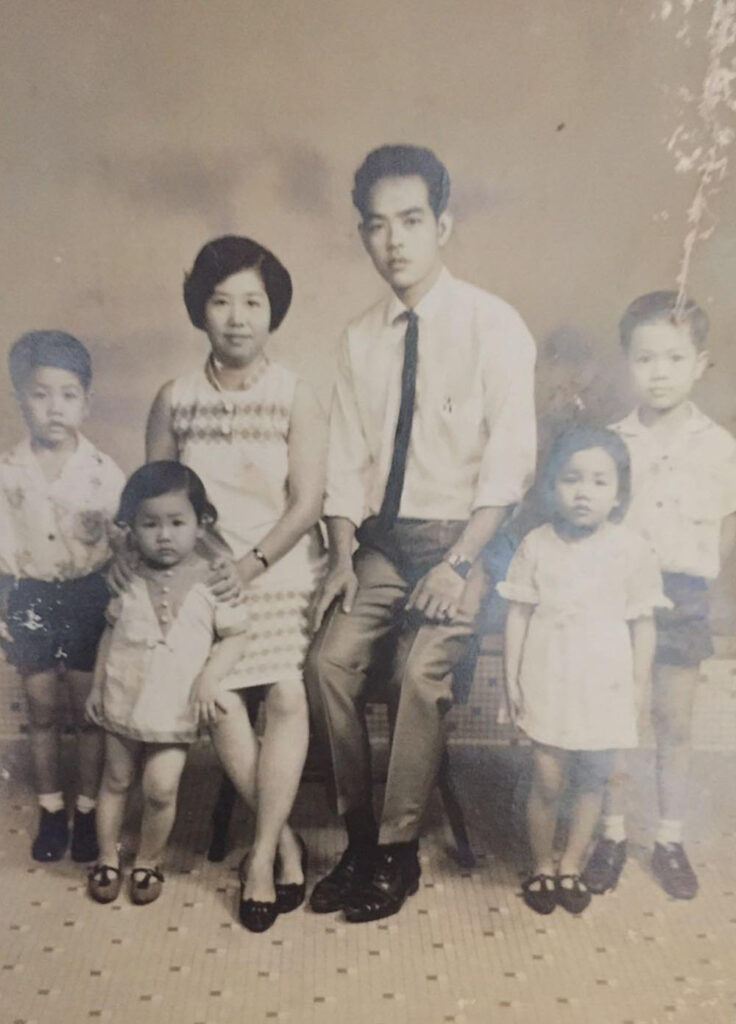
Do you have happy memories from that period?
Good memories for sure.
Life was simple.
There was a big playground I frequented with friends and classmates. All of them lived nearby and we were close to our neighbours.
The Old Airport Road Food Centre did not exist then.
In a car park not far away, there were many push carts selling food and many of the hawkers were my neighbours.
What was the Old Airport Road neighbourhood like in those days?
There were lots of gangsters and drug addicts.
So one’s willpower had to be very strong in order not to fall into bad company.
You lived in the flat in Jalan Satu until you were an adult?
Actually, no.
When I was in secondary four, we moved across the street to a three-room flat in Dakota Crescent. It was still a rental flat but much bigger.
By 1972, the Old Airport Road Food Centre had opened and it became my canteen. My father was an electrical and plumbing contractor while my mom helped out at a friend’s hawker stall. They worked long hours so I ate lunch and dinner there every day.
I am the youngest in the family and I was often the runner buying food for my siblings.
"As a kid, I went out a lot to ‘network’ with the neighbourhood kids. I would learn new games and go home to teach my sister, who was very reserved."
How many of you in total?
I have two brothers and one sister.
A bit cruel to make the youngest girl do all the dirty work right? I thought boys are usually the ones running errands.
Not really. I was a 花脚 (pronounced huay kar in Hokkien; literal translation — flower feet) who loved going out so I didn’t mind at all.
As a kid, I went out a lot to ‘network’ with the neighbourhood kids. I would learn new games and go home to teach my sister, who was very reserved.
What about schools?
My primary school was Guillemard East and I went to Maju Secondary, where I was a Girl Guide.
Was Maju a first choice because it was near your house?
My parents probably didn’t want me to travel too far and Maju was just opposite my house. My dream choice would have been Tanjong Katong Girls’ School but I knew that I was not smart enough for that.
I didn’t like studying. I just wanted to play.
You knew that from a very young age?
Hmmm, yes.
I think I could study if I really wanted to. But I was very playful.
I believe my family background had a lot to do with my decisions.
"I didn’t like studying. I just wanted to play."
Can you explain that?
My parents quarrelled a lot and I am sure that affected my childhood.
My father was an alcoholic. At times, he couldn’t manage his emotions and became violent and impulsive.
Overtime, I developed a phobia.
I knew that every night that he was out drinking, there was a high chance that we would not have any peaceful sleep.
So that you could move out and be independent?
Not to move out. But at least I would have financial independence.
My sister had the same thought and got married early, at 23.
We are quite different.
She is introvert and timid. She doesn’t dare to fly or stay in a hotel on her own.
You started working after secondary four?
While waiting for my ‘O’ level results, I started my first hotel job at Hotel Tai-Pan, at Victoria Street.
I was assigned to work at the front desk.
It was owned by the Jack Chia-MPH Group back then and it has gone through many name changes. It is now the Hotel Grand Pacific.
Why did you choose the hospitality line?
When you work at the front desk, you look glamorous and you get to wear a nice uniform.
F&B (food and beverage) wasn’t really a choice because I am too small-built. I could not imagine carrying the heavy trays and plates.
"F&B (food and beverage) wasn’t really a choice because I am too small-built. I could not imagine carrying the heavy trays and plates."
Were your family supportive of your career choice?
Hotels were not good places to work in those days.
My dad, especially, feared that I would pick up a lot of bad habits such as partying, smoking and drinking.
But I was very stubborn. I did not want to listen to anyone.
How did you do in the ‘O’ levels?
I didn’t do well so I had to go back to Maju to repeat a year.
I did better on my second attempt but by then, I was already convinced that working in a hotel was what I wanted.
So you went back to the same hotel?
No. I ‘upgraded’ and went to work at Ming Court Hotel (now Orchard Parade Hotel).
At that time, it was a five-star establishment.
I like meeting and observing people so a front desk position was perfect for me.
You knew from a very young age what you wanted?
I wanted to be a flight stewardess but I am too short.
How long were you at Ming Court?
Only three months. I didn’t like the supervisor.
Because I was a new staff member, he dumped a lot of tasks on me.
He was lazy and uncaring, and I didn’t think I would be able to learn much or go very far.
"I wanted to be a flight stewardess but I am too short."
So you changed jobs?
I left them to join Hotel Royal at Newton Road.
I was not at the front desk this time although I was the front office cashier. The job was different and I had a chance to learn new things.
So you have always wanted to be on the frontline?
I wasn’t very talkative but I am kind and easygoing.
I was young and had a baby face.
I believe that hotel guests tend to be kinder to people like me.
They won’t give you a hard time?
Hardly, although I have encountered terrible guests.
I remember in my first job, a drunken guest threw money in my face when I had to collect a deposit from him when he checked in.
To make things worse, I was reprimanded by my supervisor who felt the need to protect a regular customer.
I felt very hurt.
Such incidents happened a lot, especially when I was on the midnight shift.
I asked myself, “Why do I need to be abused for doing my job?”
Can you share a good experience at work?
I had guests who were really good.
When I was starting out, being given a $200 tip was a big deal.
Somehow I was rewarded for doing nothing other than just performing my duties as a hotel staff.
Sometimes, guests also brought me food and gifts.
These were all gestures of appreciation.
Such acts made me feel good. They kept me going.
"Sometimes, guests also brought me food and gifts."
In the hospitality industry, do people tend to move a lot?
Yes we do. And you should move around when you are young. It is good to work with different operators because different brands will have different policies.
You move around to gain different experiences but I am guessing that salary also played a part in your decisions?
Yes but don’t expect hotel pay to be very high.
I started at $220 a month at my first job.
But $220 was quite a lot of money in the early 80s right? Enough right?
Not enough. Not enough for girls. (laugh)
How is that different for girls?
We need to buy clothes.
But you had uniforms.
When we went out with friends, or for supper, we wanted to look nice.
When was your first overseas posting?
I joined Dai-Ichi Hotel (now M Hotel) in 1985 as part of the opening team and the next year, the company sent me to Japan on an exchange programme.
For six months, I tried different jobs from bell girl at the front desk to a waitress in the hotel’s F&B outlets.
The hotel was in Tokyo and our hostel was in Yokohama. My daily commute each way was two hours.
It was also my first overseas trip and it was an eye-opener.
And then you came back to Dai-Ichi in Singapore?
Yes. I was bonded.
I stayed at Dai-Ichi for 14 years and that was where I met my husband.
I moved up from the rank and file and I was head of a department when I left. My last title there was front office manager.
You must have been a star performer.
I was kiasi and kiasu. And I was keen to take on new roles.
But I have to say that the 14 years were good because I had a good boss who recognised my abilities and was willing to nurture me.
She was really my 伯乐 (a good judge of talent).
kiasi 怕死 — literally means afraid to die; a popular Singaporean expression to describe someone who is afraid to make decisions, as if he will die from making a wrong decision
kiasu 怕输 — a popular Singaporean expression to describe someone who is afraid to lose
"But I have to say that the 14 years were good because I had a good boss who recognised my abilities and was willing to nurture me."
How did she help you?
She was always challenging me to try new things.
She liked to tell me, “You can do it, just go.”
When the US Navy ships were in town, she sent me to the Clifford Pier area to get the crew to stay at our hotel.
We pre-registered them and collected deposits in US dollars on the spot.
That must have been quite a daring thing to do?
Yes. And I did not know I had such guts.
Looking back, many bad things could have happened to me.
But in many ways, it was safe. If the military personnel caused any trouble, we could call the authorities.
I wasn’t the only one doing it. Many of our competitors did the same thing.
Tell me more about your 伯乐.
I first met her at Ming Court Hotel in 1983.
She was a supervisor in the reservation department and I was at the front desk.
Before she became my mentor, we quarrelled over work. I thought she was very unreasonable.
But we ended up being good friends.
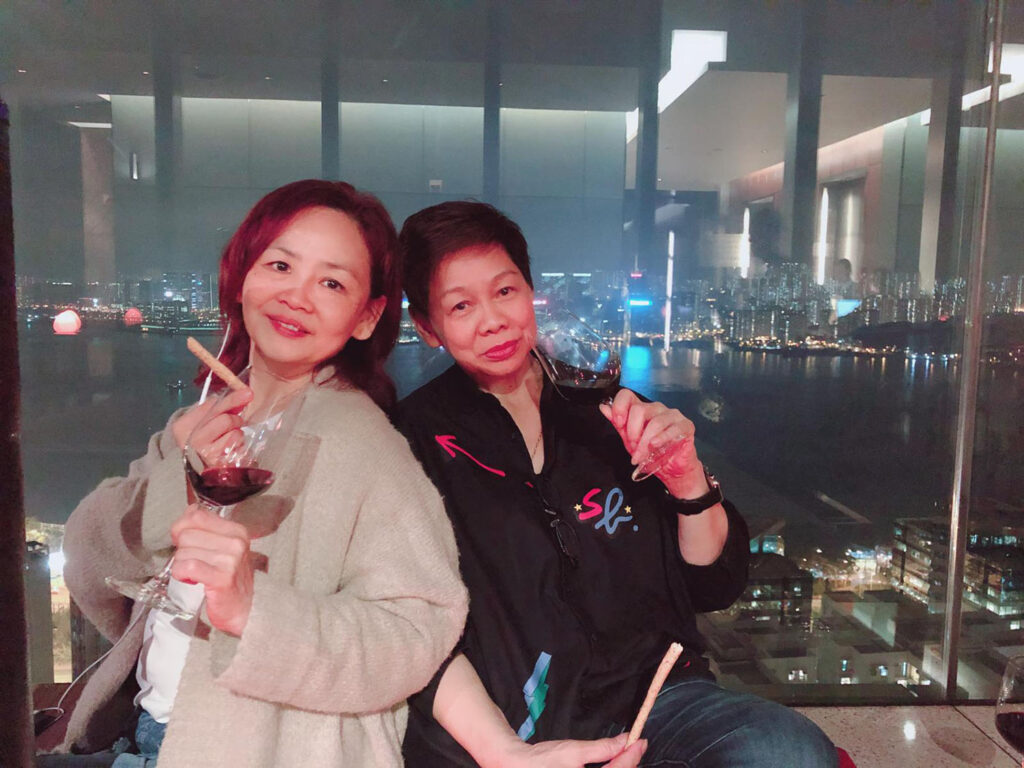
Is she still working?
She worked overseas most of her life and retired in 2023 from her last job in Chengdu.
Actually we also worked in Chengdu around the same time but for different hotels.
Wow this is a relationship that has lasted more than 40 years. What do you call her?
I still call her Miss Ho.
She’s 76 now and I still visit her at her home in the East Coast area almost every other day.
If I am travelling and not able to visit, I will call to check on her.
She is like a mother to you?
Yes, I think so. I respect her.
She is a mom although sometimes, more like a sister.
We share a lot of things despite our big age gap.
Although she looks very fierce, snobbish and unfriendly, she has her soft side.
The day when I was leaving for Japan, I saw her leave the office at around 7pm. To my surprise, she returned at around 10pm with a gift — a jacket she had bought for my trip. I was deeply touched by her thoughtfulness and the effort she made to come back just to give me such a meaningful gift.
We were not on good terms then, and yet she did that.
From that day onward, I changed my perception of her.
Did you mentor others?
I believe I have helped others. My former staff still reach out from time to time.
But I don’t think my relationship with Miss Ho is one way. I believe I also helped her.
Perhaps I did certain things that she could not.
Whatever it is, I will always be grateful to her.
She is part of my family, part of me.
"I believe I have helped others. My former staff still reach out from time to time."
How did you meet your husband?
We were both in the opening team at Dai-Ichi Hotel in 1985. He was in the F&B department and I was at the front desk.
He worked very hard like me, and rose from a waiter to a general manager in another hotel in Yantai, China.
He was based overseas a lot, in different cities in China, Taiwan, and in Indonesia. He also worked on cruise ships.
We got married in 1993. He was six years older than me.
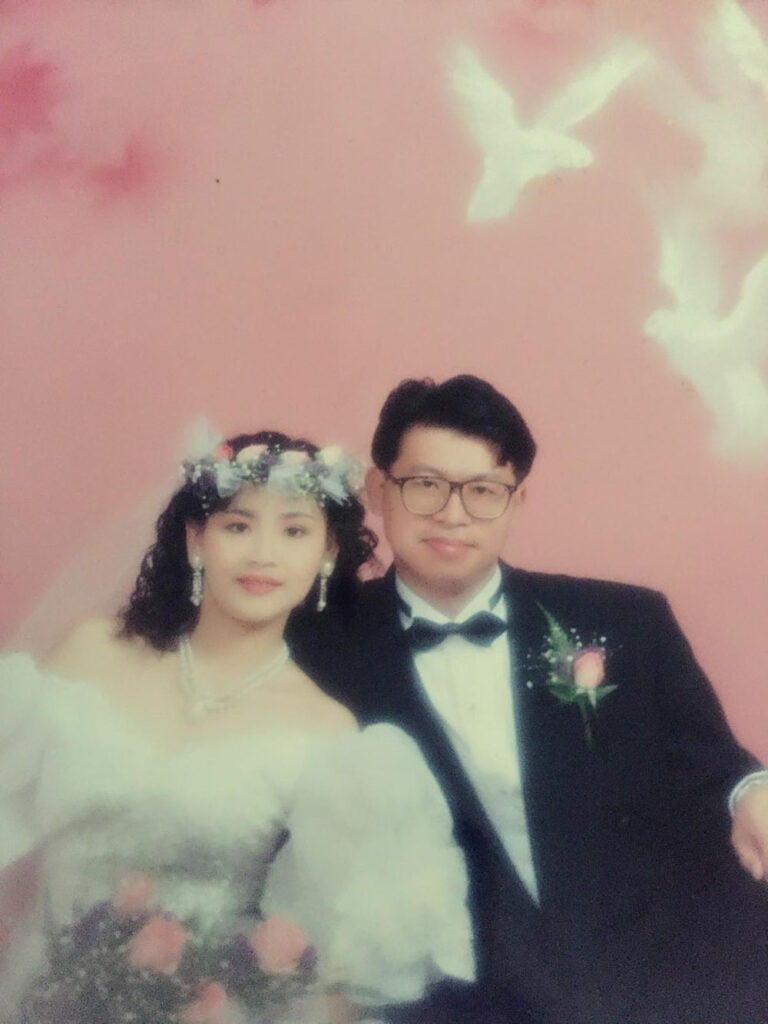
Were the two of you always working in the same city?
We lived mostly apart from each other throughout our marriage.
Since he was away a lot, I tried to be in Singapore to take care of our two daughters.
But you also lived abroad subsequently?
I went away only when he was back in Singapore in 2013.
It wasn’t an agreement between us. Things just fell into place.
I ended up working in the M Hotel in Chengdu for eight years.
After that, I moved to Hualien, Taiwan for a year.
Were you with him when he had the heart attack?
That was the worst thing.
He was alone in his apartment.
I believe he struggled.
We were both workaholics and did not call each other on a daily basis.
Your overseas stints never overlapped?
A F&B opening came up midway through my posting in Chengdu and my husband managed to join me.
Although we worked in the same city, we had different employers and only met each other on weekends.
I lived in the hotel while he had a company apartment nearer to the businesses he was managing.
He died of a heart attack in Chengdu in May 2015.
I think he was really stressed at work and did not have enough rest.
He was only 56.
"Although we worked in the same city, we had different employers and only met each other on weekends."
It seems to me that both of you shared a very practical view of family.
We have to feed the family right?
No choice lah. We have to be realistic.
But you always made sure that your children were well taken care of?
Of course. It helped that my mother-in-law stayed with us.
Your daughters did okay in their studies?
I think they did okay.
By the way, my husband also hated studying.
Tell me more about your children.
Our eldest daughter is 30 and works in digital marketing. The other daughter is 26 and works as a designer.
Both are single.
Are your daughters close to you?
I am fierce. I was quite strict when they were younger.
At their age, do they care about what you say?
They don’t have to.
They are independent and they know that I am too.
Whether I go home tonight or not, they are fine.
If I were to pack up and leave for an overseas trip tonight, they would be fine. They are used to it.
"If I were to pack up and leave for an overseas trip tonight, they would be fine. They are used to it."
What do you miss most about your husband?
Now that our daughters have grown up and we are financially sound, he should be enjoying the fruits.
He deserved to enjoy what I am enjoying.
It is all fated and I try not to think about it too much.
You had a good marriage?
All marriages have flaws. It is a matter of how much one is willing to open up.
Is there a possibility of a new romance or a second marriage?
I don’t want to be married again because I don’t want to have to worry about another human being.
But it doesn’t mean I cannot have close friends of the opposite sex.
"I don’t want to be married again because I don’t want to have to worry about another human being."
Tell me about living abroad. Did you miss home?
I did but knowing that my kids were well taken care of made it easier.
My mother-in-law and my sister-in-law stayed with us in Tampines for more than 20 years. They helped to bring up the girls.
My daughters are very independent like me.
It is quite rare but you got along well with your in-laws?
I think I get along well with people.
I am sure I’m capable of making them upset, but it is all about give-and-take.
You are close to 60 and you are still working very hard.
My job requires me to work hard.
In the hotel business, it is all about the details.
Are you the type who can let go?
Yes I can.
Maybe it is harder for me to let go when it comes to work. There is always this sense of responsibility.
I was very bad tempered in the early days.
Now, I am very patient.
"Maybe it is harder for me to let go when it comes to work. There is always this sense of responsibility."
Small-built women are like chilli padi?
Oh no! Chilli padi (a smaller but more potent version of regular chilli; often used to describe someone who is petite but has a fiery temper and personality) was my nickname!
Tiny but strong character.
Did you ever regret not studying harder?
Sometimes I do.
I believe I could have reached many goals earlier if I were better qualified.
From time to time, I enrolled in short courses to upgrade myself.
In 2010, I went back to school and obtained a diploma in hospitality from the University of Nevada campus in Singapore.
Why did you decide to do that?
I felt that I could go further in my career and gaining new knowledge would help me.
I find that in hospitality, paper qualifications are not as important. Am I right?
Hard work and commitment are equally important.
But I don’t think it’s the same now.
So if a young person wants to join the hospitality industry, what will your advice be?
Well, join only if you are prepared to sacrifice your personal time and work long hours. Forget about public holidays and weekends.
Hotels get busy during the holiday seasons and staff are expected to work even harder during these periods.
When your peers are enjoying their days off, you will still be working.
At your current workplace, do people still compare graduates and non-graduates?
I am sure they do.
A lot of things are usually unspoken.
But quite a few members of our senior management are older and probably have old-school approaches.
To them, the foundation is still very important.
Can you explain what you mean by old-school approaches?
Let’s say the hotel computer system breaks down one day. Can we still check in our guests? Can we still run the hotel?
That will be the time to see who really has the ability to solve problems on the ground.
What do you look for when you are hiring?
My priority is never about paper qualifications.
In a hotel, do you need very high qualifications?
I think it is about 体力活 (physical work).
It is about reacting to real-life situations.
You have to use your brain, be flexible. This is not something that will show up in paper qualifications.
"You have to use your brain, be flexible. This is not something that will show up in paper qualifications."
What is keeping you busy now?
My company is developing a hotel in Bhutan.
I have to make sure our hotel opens smoothly. Among many things, we have to recruit and train new staff.
Although I only joined this project midway through its construction, I feel a heavy responsibility to stay till it opens for business.
So far, my trips there have been short, just in and out.
But next year, I would probably need to be there for at least three months.
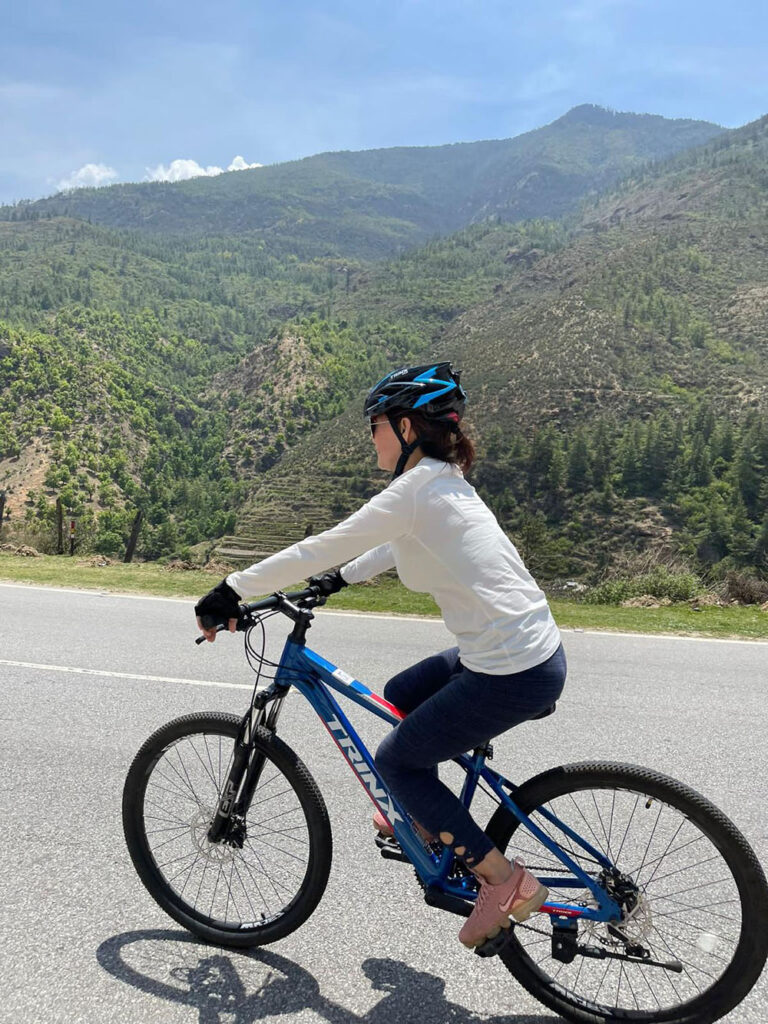
Are you afraid that you will be bored when it is time to retire?
Absolutely not.
I have so many things to do, like travelling.
I love exercising and I can pick up dancing.
I can ski, rollerskate, or bike.
How often do you travel for vacation now?
Yearly and as often as possible since my mom is still around.
At 84, she still enjoys travelling.
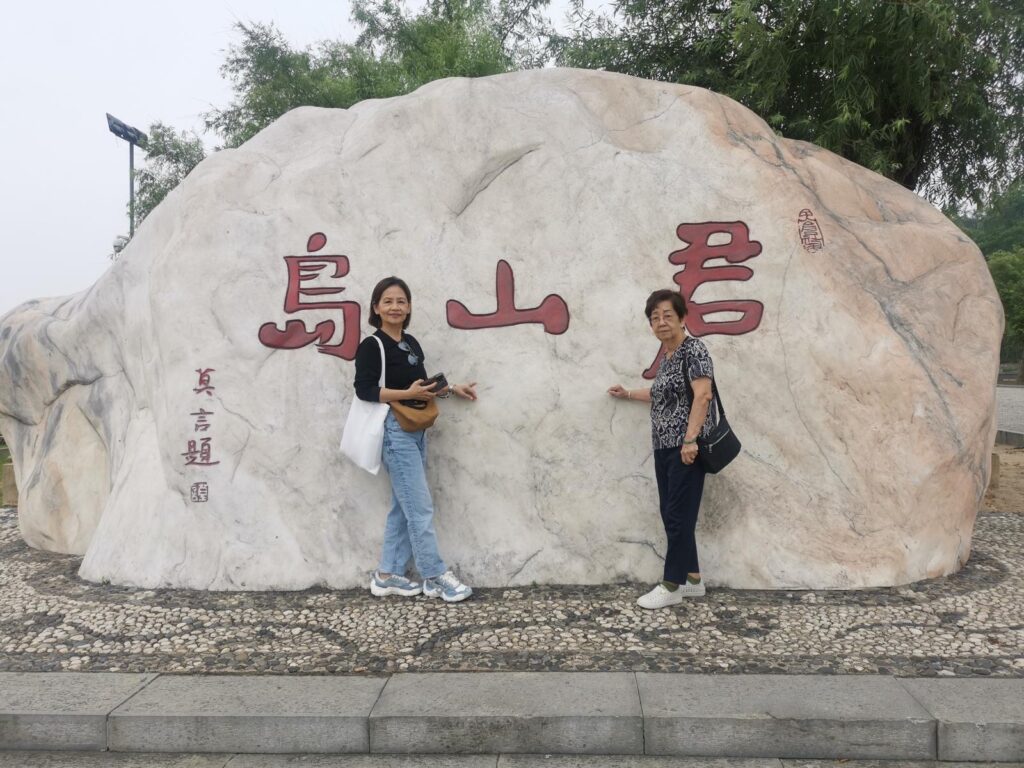
Do you wish you had spent more time with your loved ones?
Not at all. As long as I’m in Singapore, I visit my mom weekly.
She refuses to stay with any one of us, and lives alone in a rental flat.
She is very independent, just like me.
You had a hard life?
I never said it was easy.
You were born in the same year as Singapore. Do you feel that there is something special?
Well, you can say that I grew up with the country.
Singapore is independent, so am I.
